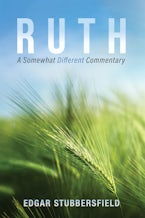The subtitle of this book is "A Somewhat Different Commentary," so how is it different? Theology without application can be lifeless and boring, and while the comments have been well-researched, contemporary application has been primarily my focus. I hope that with this commentary on the book of Ruth I have written something that can be read for pleasure as well as spiritual growth.
I started writing this commentary during the drought of 2019 that ravaged Australia, prompting me to keep my small farming valley in mind. Whenever possible I have tried to tie the lessons of Ruth back to the issues I see in my own community, one which has foreign farm workers, successful landholders, virtuous men and women, older godly women who no longer work but have influence, the issue of who gets the farm, and what constitutes citizenship.
Edgar Stubbersfield is a layman with a keen interest in writing on the Christian faith. He completed his Master of Theology with the University of Wales in 2011. He is a well-known author in Australia in a different field, in which he is an authority on timber structures.
“This is an excellent exposition of the book of Ruth. It is logical, detailed, and readily accessible. I was both astonished and delighted by the research undertaken and how clearly it was expressed.”
—Gary Crew, Professor emeritus of Creative Writing and Literature, University of the Sunshine Coast
“The book of Ruth is a particular favorite of mine, and Edgar Stubbersfield’s book Ruth: A Somewhat Different Commentary is exactly that. It is well researched with numerous references to follow up, and it provides highly applicable lessons for living and spiritual development for people in today’s world. An excellent read for a better understanding of this Old Testament book.”
—Ralph Bailey, Principal Architect, Guymer Bailey
“Most Bible commentaries are so cluttered with technicalities and problems that they leave us with hot heads and cool hearts. Ruth has the reverse affect. It reveals the hidden God and how his loving-kindness is made manifest in a world of need, through respect for and practical care of the poor, foreigners, women, and children. Here a biblical story of consummate artistry receives profound treatment from one who is himself an exceptional storyteller and wordsmith.”
—Stuart Piggin, Director of the Centre for the History of Christian Thought and Experience, Macquarie University





